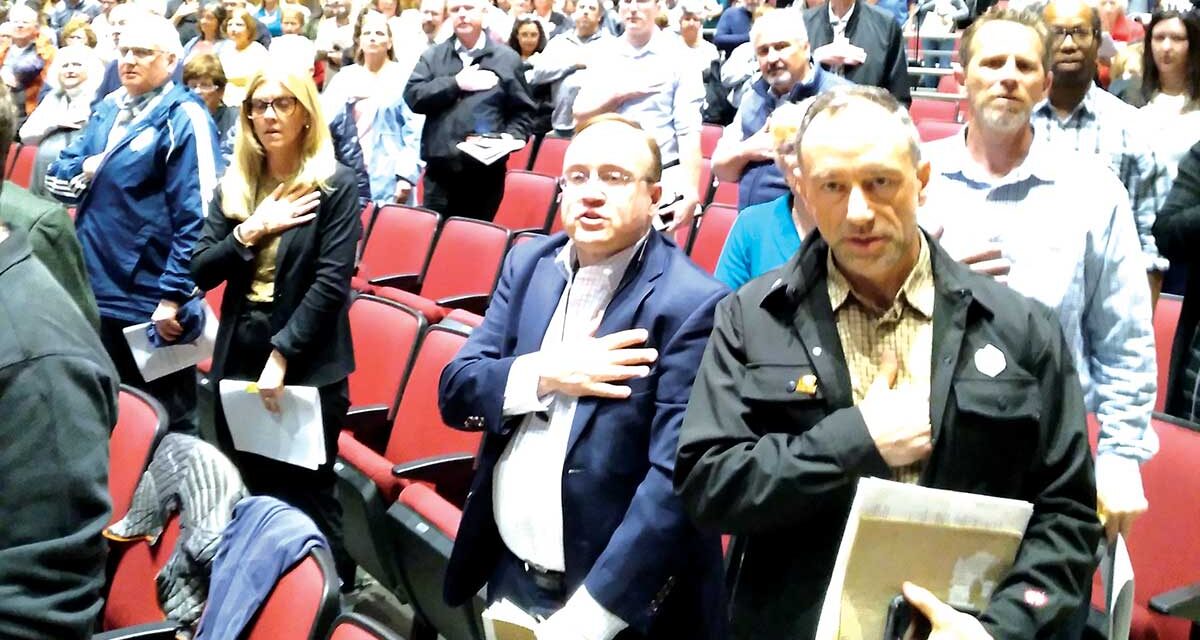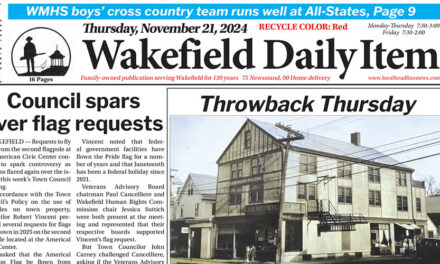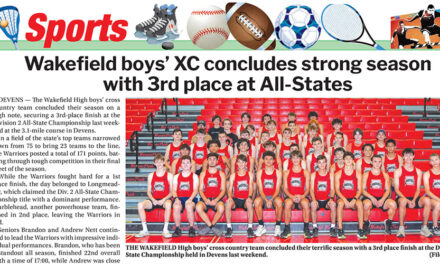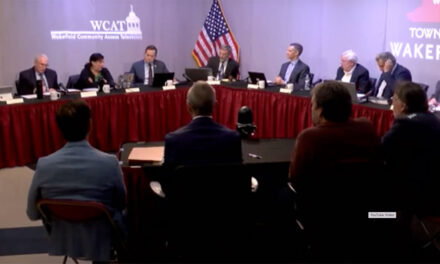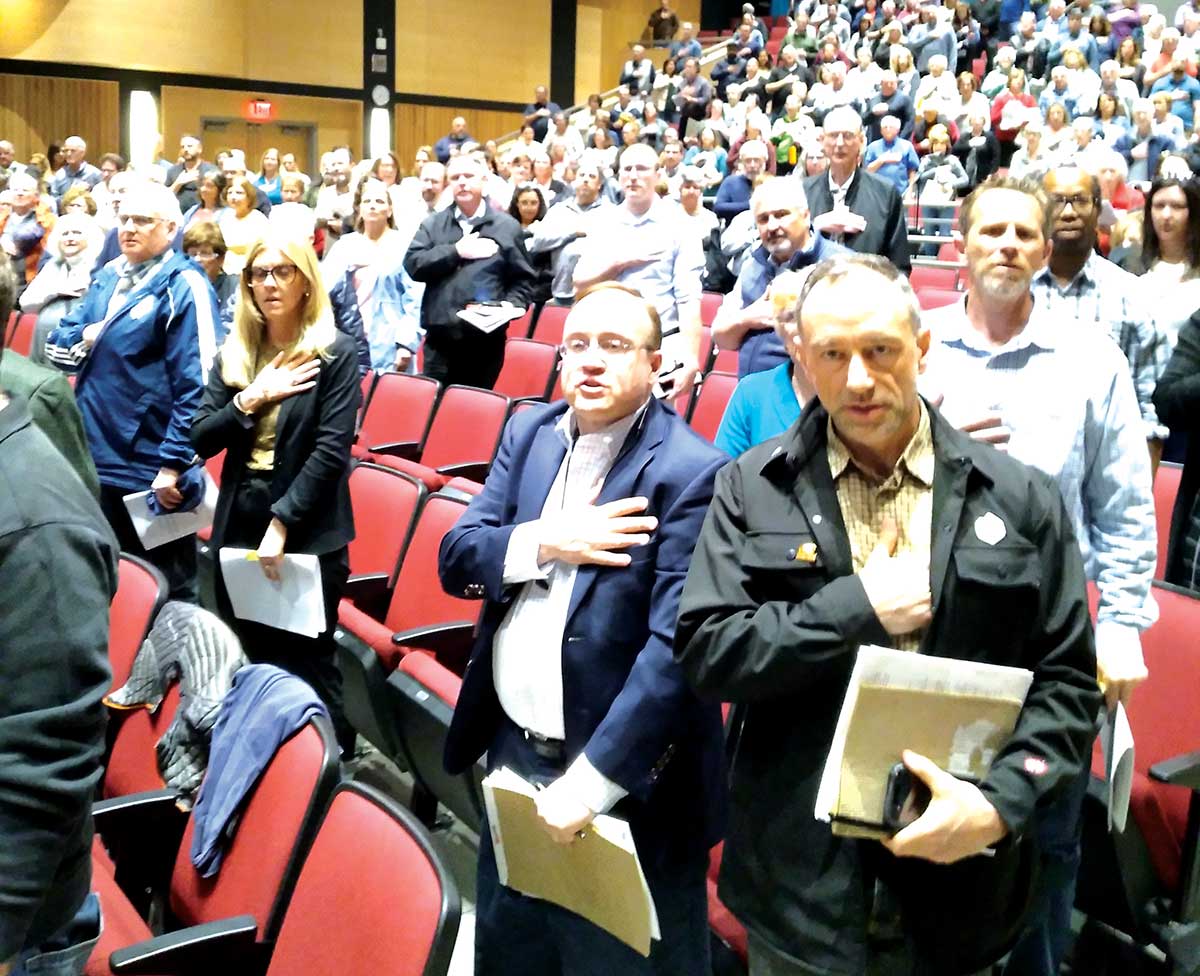
Town meeting attendees in Wakefield recite the Pledge of Allegiance before debating issues in the Galvin Middle School auditorium. The November 16, 2024 TM will feature eight articles. (File Photograph)
WAKEFIELD — When Regular Town Meeting convenes at 8 a.m. on Saturday in the Galvin Middle School Auditorium, voters will face a warrant with just eight articles. But that’s no guarantee of a short meeting.
Article 4 seeks the voters’ approval of the town’s latest plan to comply with Section 3A of Massachusetts General Laws Chapter 40A, also known as the “MBTA Communities Act.”
This law requires that MBTA communities, including Wakefield, must have at least one zoning district of reasonable size in which multi-family housing is permitted as of right and meets other criteria set forth in the statute. “As of right” means that a developer or homeowner could convert an existing single-family home to multifamily housing without the need of a Special Permit, variance or other zoning relief.
At last spring’s Annual Town Meeting, voters rejected three different compliance plans. The main plan was sponsored by the Planning Board and went well beyond the law’s requirements in terms of geographic area and housing units allowed. Two “minimum compliance” plans were also rejected by Town Meeting voters – one created by the Planning Board as an alternative to its main plan, and one submitted by a citizens’ petition.
After Annual Town Meeting rejected those proposals, the Town Council formed its own subcommittee to create a new and different compliance plan, citing the fact that the Commonwealth has threatened to withhold a growing list of state grants from municipalities that do not comply with the MBTA Communities Act by the Dec. 31, 2024 deadline.
The Town Council’s “40A Subcommittee” of Michael McLane, Edward Dombroski and Robert Vincent held a number of meetings and public forums over the last several months as they worked with senior Town Planner Samantha Elliott to create a new minimum compliance plan that will be presented at Saturday’s Town Meeting under Article 4.
The subcommittee has said that, unlike the Planning Board’s earlier compliance models, their new plan avoids residential neighborhoods and focuses on commercial areas and areas that are already developed. While these targeted areas may have the potential for more units under the law, the subcommittee believes that those units are unlikely to be constructed since those areas are already built out, thus preserving the character of the neighborhoods.
Opponents of the state mandate have said that the state has no business interfering with local zoning. They also cite the fact that voters clearly rejected three compliance plans earlier this year. They maintain that the cost to the town in terms of infrastructure, increased school enrollment and other impacts will surpass the amount of any grants that the town might get. They further note that there is no guarantee that the town will be awarded these grants.
A full debate is expected under Article 4.
Under Article 1 Town Meeting will hear Town Administrator Stephen P. Maio’s final report on Fiscal Year 2024 (which ended June 30). Maio is expected to talk about the town’s past, present and future finances.
Article 2 is an annual article that seeks voter approval to use a sum of money from the town’s Free Cash account to balance the current year’s (FY 2025) town budget.
Article 3 will ask Town Meeting to vote to appropriate a sufficient sum of money for the design and construction of a solar array project on the roof of the Galvin Middle School, such project to include all related costs of interconnection with the Town’s electrical system, and to determine whether to raise this appropriation by borrowing or otherwise.
Article 5 seeks Town Meeting approval to implement a collective bargaining agreements between the Town of Wakefield and the Wakefield Clerical (Town Hall) AFSCME Council 93, Local 3117 for the period July 1, 2024 to June 30, 2027 and to provide that the Town raise and appropriate or transfer from available funds a sufficient sum of money to implement the agreement.
Article 6 will ask Town Meeting voters to raise and appropriate or transfer from available funds including water retained earnings and sewer retained earnings a sum of money to supplement the water and sewer budget for the period of July 1, 2024 to June 30, 2025.
Article 7 would create a bylaw requiring The Building Inspector to prepare a yearly report for the Annual Town Report that includes a list of the new major buildings that were inspected. “Major” is here defined as at least three stories high and ten housing units – this definition of major may be defined in the future by Town Council.
Article 8 is an anti-Israel citizens’ petition that asks the town to “pledge to not use town resources to enable violations of human rights and International Law by Israel – The Town shall refrain from purchasing Israel Bonds or other securities issued by the State of Israel as long as Israel remains in violation of international law, and the Town will refrain from purchasing goods and services from, or investing or depositing funds directly in, any company or financial institution that facilitates and enables Israel’s violations of international law and human rights as part of the Israeli occupation of Syrian and Palestinian lands, or as part of Israeli apartheid, as detailed in the United Nations General Assembly Resolution A/RES/ES-10/24, adopted 19 September 2024, including, but not limited to, those companies listed in the Occupations section of the Investigate project of the American Friends Service Committee, available online at https://investigate.afsc.org/occupations; and no officer of the Wakefield Police Department shall be permitted to receive police training from Israeli police departments, Israeli military units, or trainers who provide training to Israeli police departments or military units; and future Annual Reports of the Town shall certify that the Town complied with this Town Meeting Action during the report year; or to see what the Town will do about it.”
The spring Annual Town meeting rejected a similar anti-Israel article.

